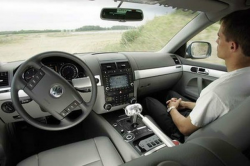
— Be advised that if you live in certain areas of the U.S., the next car you wave at may not have a driver to wave back, especially if you live or work near these areas:
- City of Pittsburgh and the Thomas D. Larson Pennsylvania Transportation Institute
- Texas AV Proving Grounds Partnership
- U.S. Army Aberdeen Test Center
- American Center for Mobility (ACM) at Willow Run
- Contra Costa Transportation Authority (CCTA) & GoMentum Station
- San Diego Association of Governments
- Iowa City Area Development Group
- University of Wisconsin-Madison
- Central Florida Automated Vehicle Partners
- North Carolina Turnpike Authority
Those locations have been chosen by the U.S. Department of Transportation (DOT) as "proving grounds" for driverless car technologies. DOT calls these locations "pilot sites" to encourage companies to test and share information about autonomous vehicles.
Federal regulators want those locations to be used to test driverless car technology before widespread use, especially how disadvantaged people may be helped by driverless vehicles. The locations will also be used for testing on how to get the most safety benefits when a driverless car works in concert with sensors embedded in surrounding infrastructure and how to best converge data.
Representatives of the DOT say the 10 locations were picked out of a group of 60 applicants, including academic institutions, state Departments of Transportation, cities and others. Seeing the potential benefits of a quickly expanding self-driving technology, some states are quickly creating regulations friendly to driverless car companies to draw in those companies.
Although only 10 locations currently qualify as official proving grounds, individual states continue to update regulations in an effort to convince driverless car companies to test the technology in their states.
While Google and other driverless car companies have tested the technology primarily in California, the states of Nevada, Florida, Tennessee, Arizona, Washington, D.C. and Michigan have made testing of the cars legal on the roadways.
Michigan legislators say the state's regulations are the most friendly to driverless car companies, legalizing self-driving cars on Michigan roads for personal use and ride-sharing. Michigan points out self-driving cars don't need a human in the driver's seat, in contrast to California and Nevada that require a driver in the driver's seat.
In addition, Michigan's policy also allows vehicles on the roads even if the vehicles don't have steering wheels or brake pedals.




